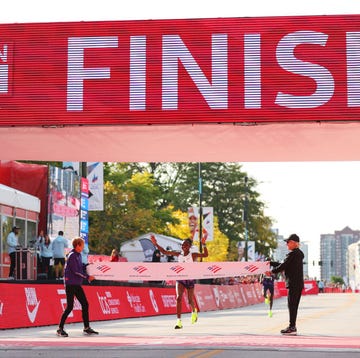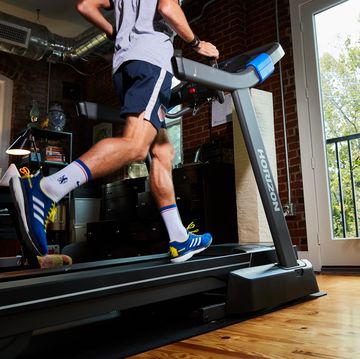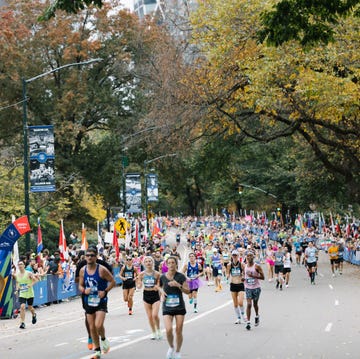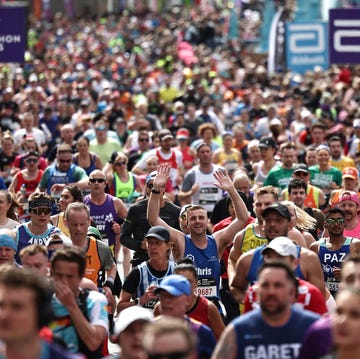You get your marathon place, you put in the months of solid training, you do the prehab and you diligently manage niggles/illnesses/life stress, only for something to be pulled out from beneath you just before race day. It happens more than you'd think. It's happened to me, again.
I was due to run my 20-miler this weekend, but a niggling knee injury forced me to postpone it. That was fine, I decided. I'd rest it, ice, elevate, foam roll, do all the things you're meant to do, then try again on a day off yesterday. So I did - I made it 3 wonderful, pain-free miles before something started to twinge. It felt like a knot pressing into my IT band - I paused, massaged it, and carried on. It got better and then worse, a shooting pain towards my hip that almost made my leg buckle. I stopped at 4 miles and jumped on a bus home, certain that a little dry needling at my physio appointment the following day would sort it out. That was until I headed to the shops in the evening and the pain flared so badly I was left barely able to walk. I limped through the front door in agony with a Morrisons bag swinging from each hand, and my flatmate promptly took me to A&E.
Having ruled out a stress fracture, my morning physio appointment involved a quad full of dry needles (we think the many adhesions in my outer quad muscle are to blame) and a brief ultrasounding. My leg feels much better compared to my post-supermarket stagger home yesterday, but I'm left in a hard spot. I'm lucky enough to have a place in London Marathon, which takes place in just over two weeks. I trained for it two years ago and had to pull out last-minute due to a severe lower leg injury. Now, I have the option of pulling out again or attempting to run it in pain and getting what I consider would be a 'bad time'.
It's hard to explain to non-runners the emotional turmoil of being in this situation. When you've sacrificed time with family and friends, you've spent much of your disposable income on running gear, physio and massage, you've given up weekends to put in long miles and recover afterwards. It's something you love doing and you've thought about it hundreds of times a day for the last few months - this marathon and the training for it has always been at the forefront of your mind. And now? You might not be able to do it.
Trust us, itll make you feel better?
1/ Take a social media break
It's especially tough to manage marathon FOMO with the rise of social media in the running world. Chances are, you follow other runners preparing for marathons and see them excitedly Instagramming their taper trepidation. Or that guy you went to school with who's never once shown an interest in running is suddenly smashing out 18 miles and posting his splits on Facebook. If it's too painful to see these posts, don't be afraid to unfollow the accounts or hide their updates. But remember, runners aren't making these posts to taunt you and your malfunctioning limbs - if you share how you're feeling, chances are they will support and sympathise with you.
2/ Let go of your idea of the 'perfect race'
No doubt on your long runs you've pictured the moment where you have the finish line in sight, muster what energy you can from the depths of your body and run those final steps to victory. That dream moment may not happen, not this time round. You may have to leave behind your hopes of a PB. That's okay. It's devastating after all these months of preparation, but even making it this far in training is a massive achievement. Time is only a number, and as a wise runner said on Twitter this morning 'it doesn't matter if you fail, just that you try.'
3/ Remember it's okay not to run
How to avoid going out too fast in a race plantar fasciitis and Athens Marathon 2024: Everything you need to know to get to the finish line, but nobody would blame you if you don't want to. If running the marathon will leave you worse off physically, and especially if it'll leave you with permanent damage, do not run it. It's upsetting, but there will always be other marathons. There won't be other legs or feet for you to run on.
4/ If you don't run, escape
This may not be such an issue if your goal race is far away from where you live - if it'll upset you to see the race going on, keep any TV coverage off and avoid social media on the day. If you live in the city your race takes part in and you think seeing the commotion will be too painful, try escaping elsewhere. When I had to pull out of London two years ago, my best friend invited me to her family house in the countryside, where we had a weekend of wine, eating and absolutely nothing marathon-related.
5/ Explore your options
See an experienced running physio (if you haven't already) to get a professional opinion on your injury. They'll be able to treat your symptoms and help make you more comfortable. In some cases, a local pain-relief or steroid injection may help. This is something a specialist physio or a sports medicine doctor may be able to do. Do some research into the services in your area and see what you can find.
6/ Cry
Trust us, it'll make you feel better.
7/ Remember you're not alone
Despite all the runners in seemingly flawless marathon prep you see online, there are plenty of other people in the same situation as you. There's me. There's our Digital Editor Ben, who last year was hit by a car one week out from London Marathon. There are people who get it, who can offer a sympathetic ear or a shoulder (albeit maybe a digital one) to cry on. Don't be afraid to reach out - it may not cure your injury, but it'll certainly help you feel better.













